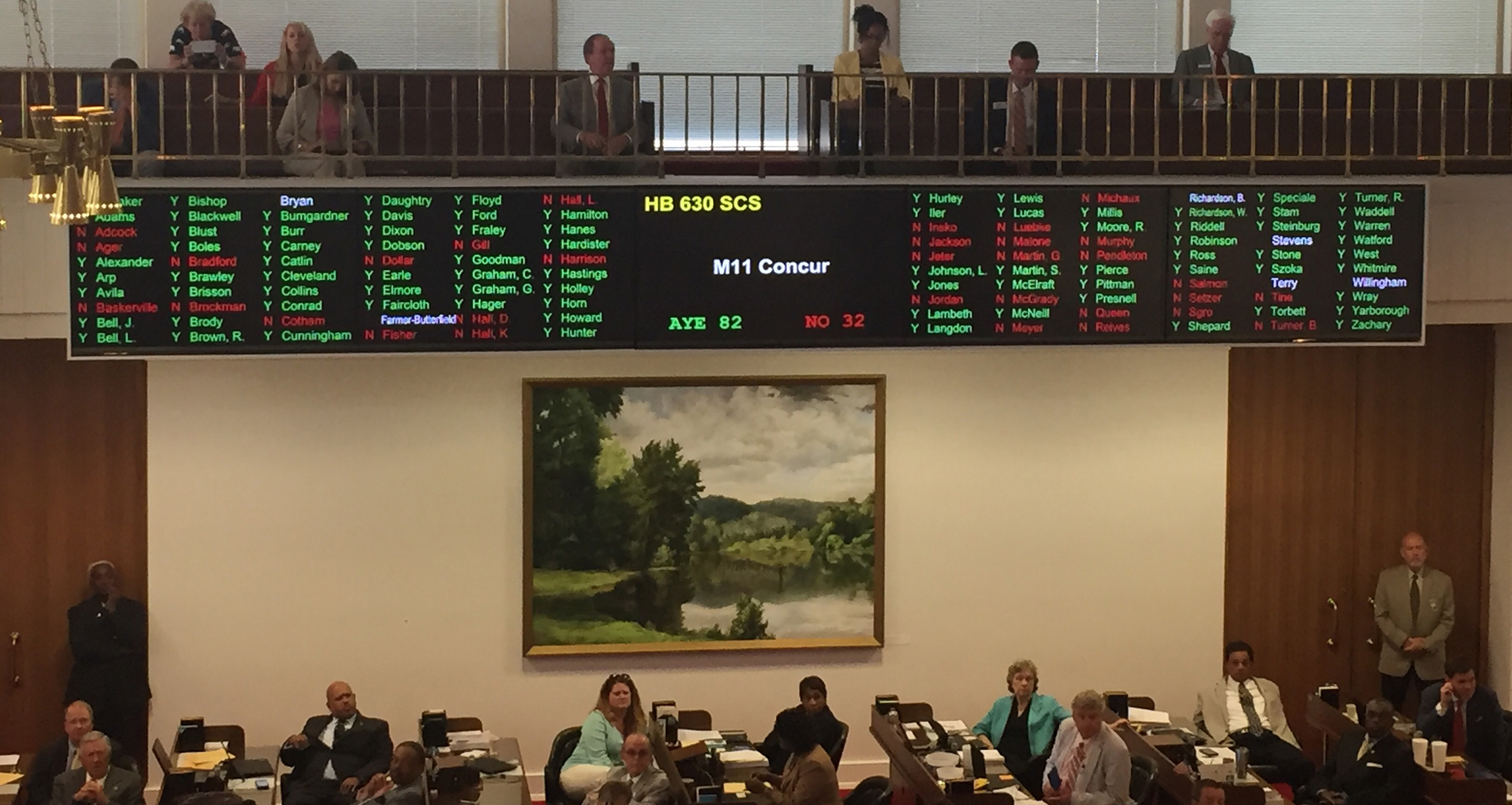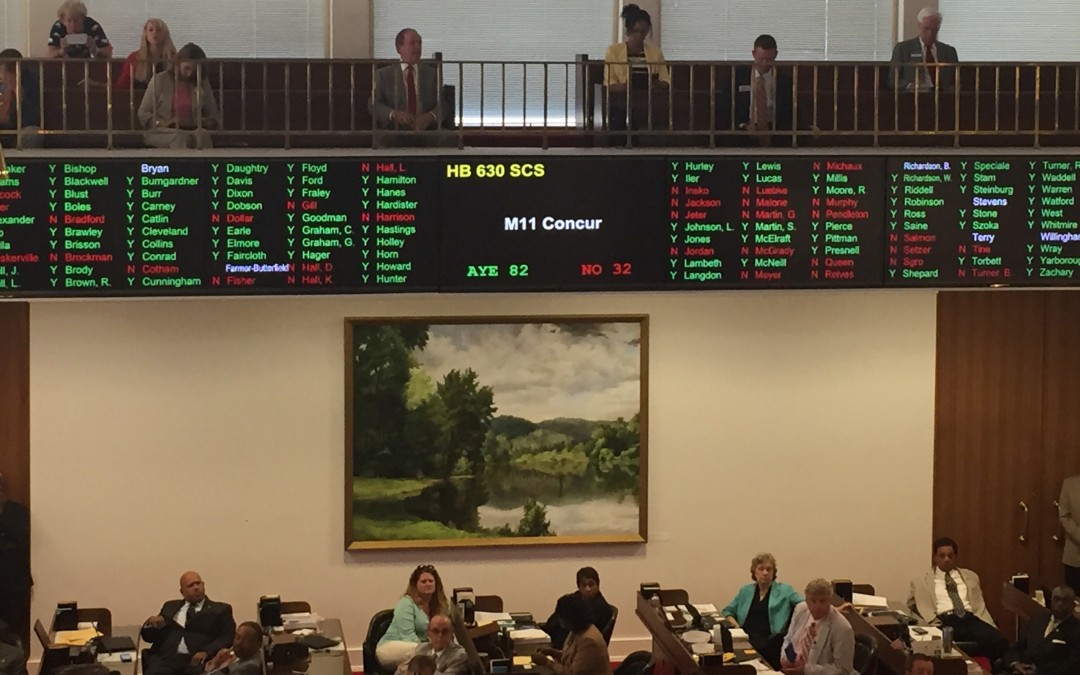MountainTrue Raleigh Report, Issue 21: Hallelujah, That Session Is Over

Action Expired
Sine die (adverb). Definition: with reference to business or proceedings that have been adjourned with no appointed date for resumption, as in “On Friday, July 2, the North Carolina General Assembly adjourned sine die.”
In this edition of the MountainTrue Raleigh Report – It’s OVER! On Friday, legislators adjourned the short session sine die and headed back home – just in time for the Fourth of July holiday.
Up until the very end of session, there were a number of important bills still up in the air. Some good things happened and some bad things didn’t. Here’s the rundown on the end of session – and our overall take on what The Honorables did and didn’t do this year.
Coal Ash Rests With McCrory
If you remember, Chuck McGrady’s (and others’) coal ash legislation met with the veto stamp earlier this session. A veto override seemed likely, but the Senate stepped in and forged a “compromise” with Governor McCrory.
The new bill eliminates the state’s Coal Ash Commission and requires Duke Energy to provide drinking water either through water lines or filtration systems to residents within a half-mile of the coal ash pits. DEQ will also assess how far contaminants from the coal ash ponds have traveled in groundwater and could be required to take further measures for clean water.
Under the bill, once Duke Energy has provided the water lines or filtration systems to local residents and can certify that it has fixed leaks or problems with dams at a coal ash site, DEQ is required to classify the site as low risk. That designation could allow Duke to cap the site and leave the coal ash in place in unlined basins for the foreseeable future.
MountainTrue and a number of other environmental organizations – as well as Rep. McGrady – opposed this legislation. In our view, this latest coal ash bill guts the criteria the state uses to determine how dangerous the coal ash pits are to surrounding communities. Unless something changes, the result will be that coal ash pits will continue to pollute our groundwater as well as our rivers and streams.
The bill is now awaiting action by the governor, who seems all but certain to sign it.
Crunching the Budget Numbers
There is plenty of good and bad in the new, $22.34 billion budget. You can read overview stories like this one from WRAL for a sense of the big-ticket items. Here are some provisions of special interest to us:
-
DuPont Recreational Forest receives $3 million in funding for new restroom and parking facilities, as well as a provision that would allow the forest to compete with other parks projects in the annual round of grants from the state’s Parks and Recreational Trust Fund. New staffing positions are also created to help oversee DuPont’s management.
-
The budget restores funding and positions for the Natural Heritage Program, which was reduced by $314,726 in 2015. The revised net appropriation for the program is $764,726.
-
An $8.6M increase for the Clean Water Management Trust Fund is included, bringing the total appropriation for FY16-17 to $22.4 million. That is the single largest appropriation to the CWMTF since 2010.
-
The Agricultural Development and Farmland Preservation Trust is increased by $1 million.
-
Funding for the Parks & Recreation Trust Fund was maintained, bringing the total appropriation for FY16-17 to $22.7 million.
-
A provision to repeal stream buffer rules, endangering water and habitat, was largely eliminated, but clean up rules for Jordan and Falls lakes in the Triangle were delayed even further.
Things Left On the Table
The two regulatory reform bills – S303 and H593 – died when session ended. That’s good news for those of us who care about the environment.
Some of the items of concern in these bills included:
-
A prohibition on the state Environmental Management Commission (EMC) and Division of Environmental Quality (DEQ) from enforcing air emissions standards that regulate fuel combustion that “directly or indirectly” provides hot water or heating to a residence, or heating to a business.
-
Requiring the EMC to achieve a 3/5 majority to adopt federal new source performance standards (NSPS), maximum achievable control technology (MACT), or hazardous air pollutant standards; and disallows state enforcement of federal standards until the EMC adopts them.
-
Prohibiting stormwater control measures, exempting landscaping material from stormwater management requirements and amending stream mitigation requirements.
H3, the Omnibus Constitutional Amendments bill, was also left on the table as session ended. The bill proposed three constitutional amendments for the November ballot. The amendments concerned eminent domain; the right to hunt, fish, and harvest wildlife; and capping the state’s personal income tax at 5.5 percent (the current cap is 10 percent). Look for the cap on income tax to be a major issue during the 2017 session.
Post Mortem
Judging the 2016 legislative session and its impact on the environment does not lead to clear-cut generalizations.
On the plus side, the state budget makes important – and substantial – new investments in open space preservation, both statewide (with a large bump in funding for the Clean Water Management Trust Fund) and in western North Carolina (DuPont State Forest).
On the downside, the budget also includes rollbacks on clean water provisions for two of the state’s largest drinking water sources – Jordan and Falls lakes. Here again, however, things could have been much worse, as the original language in the Senate budget would have repealed protections in a number of other river basins. Thankfully, those protections were left in place.
Lawmakers also get high marks (of a sort) for what they didn’t do. A political meltdown that occurred at the end of session meant that two regulatory “reform” bills died when the Senate abruptly ended the session before they could be approved – taking a number of bad policies down at the same time.
Still, it’s hard to give the legislature good grades on anything in light of what it did on coal ash. The revised legislation seriously weakens the protections approved just two years ago. Perhaps most appalling, the new law allows DEQ to reclassify coal pits all over North Carolina and likely allows Duke Energy to leave the coal ash in place – in unlined pits – instead of moving it to safer, lined facilities.
Overall, we have to give the legislature low to middling grades – at best – this year when it comes to protecting our water, our air and our open space.
That’s probably enough about the General Assembly for now. In future updates, we’ll let you know about some upcoming meetings with legislators we are planning in WNC. And we’ll have news about our plans for the 2017 legislature, which begins in January. In the meantime, enjoy the summer and the knowledge that the legislature is out of session and can’t do any more damage for the rest of the year.

